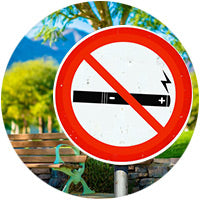Thanks to recent legislation signed by Governor Jerry Brown, California vaping laws are now among the most restrictive in the nation. On May 4, 2016, California’s new e-cig laws raised the minimum age requirement for purchasing tobacco and e-cigarette products from 18 to 21. The new e-cig regulations also extend no-smoking zones around pubic schools, which also prohibits vaping, and a new bill seeks to ban e-cigs completely from California’s beaches and parks.
California Vapin’: New E-cig Laws Underway

According to California state law, e-cigs are now classified as tobacco products, and all rules that apply to traditional cigarettes are also applicable to vapor products. A pending bill known as SB 1333 would prohibit smoking and vaping in parks and beaches punishable by a $250 fine. The legislation is sponsored by Sen. Marty Block with the intention of preventing fires and reducing litter on public property. Experts have estimated that the cost of installing new “no-vaping” signs in all of California’s parks and beaches could cost taxpayers more than $1 million.
Proponents of SB 1333 include Sierra Club California, the American Cancer Society Cancer Action Network and the American Lung Association. They all rightfully acknowledge that cigarette butts are non-biodegradable and create potential environmental hazards including forest fires. Sen. Block has also cited secondhand smoke as a public health threat, so banning tobacco cigarettes keeps the air clean for all citizens. These are all great reasons to restrict smoking in public, but are these concerns really justifications for vaping bans?
How Necessary are Outdoor Vaping Bans?
Lit cigarette butts remain the leading cause of wildfires, and incidences of fires have decreased steadily along with falling smoking rates. Despite sensationalist headlines following reports of exploding e-cigs, mainly due to user mishandling, there have been zero reports of wildfires started by e-cigs. Unlike cigarette butts, e-cigs do not contribute to litter; in fact, many disposable e-cig components can be recycled. Nearly all studies measuring the effects of secondhand vapor suggest there are no major health risks for vapers and bystanders, so banning vaping from beaches and parks does little to protect the public.
A Sign of Things to Come for Vapers?
These developments in California are reflective of the federal government’s attitude toward tobacco alternatives. For example, the U.S. National Park Service instituted a vaping ban on all federally owned lands under its jurisdiction in late 2015. New vaping restrictions are expected to proliferate across the nation now that the FDA has officially deemed e-cigs as tobacco products. Vaping enthusiasts in California should contact their state representatives and tell them that vapers have been regulated enough, and it’s time to try smarter approaches to protecting people against the harms of traditional tobacco cigarettes.






